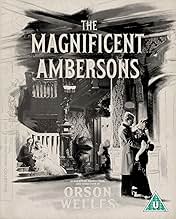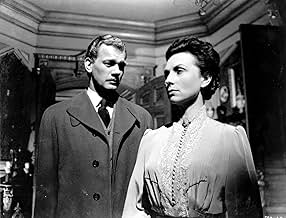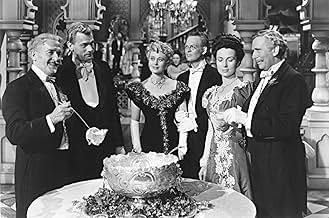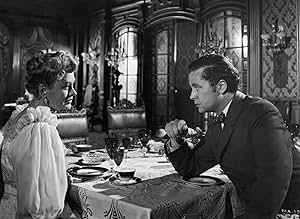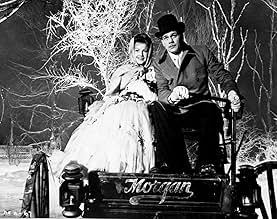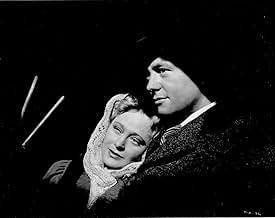IMDb-BEWERTUNG
7,6/10
28.099
IHRE BEWERTUNG
Füge eine Handlung in deiner Sprache hinzuThe spoiled young heir to the decaying Amberson fortune comes between his widowed mother and the man she has always loved.The spoiled young heir to the decaying Amberson fortune comes between his widowed mother and the man she has always loved.The spoiled young heir to the decaying Amberson fortune comes between his widowed mother and the man she has always loved.
- Für 4 Oscars nominiert
- 8 Gewinne & 4 Nominierungen insgesamt
Orson Welles
- Narrator
- (Synchronisation)
Edwin August
- Citizen
- (Nicht genannt)
Georgia Backus
- Matron
- (Nicht genannt)
Harry A. Bailey
- Citizen
- (Nicht genannt)
Olive Ball
- Mary - Maid
- (Nicht genannt)
Jack Baxley
- Reverend Smith
- (Nicht genannt)
William Blees
- Young Man at Accident
- (Nicht genannt)
Lyle Clement
- Citizen
- (Nicht genannt)
Bobby Cooper
- George Minafer as a Boy
- (Nicht genannt)
Don Dillaway
- Wilbur Minafer
- (Nicht genannt)
Empfohlene Bewertungen
This is a wonderful film, one of great pathos and sensitivity. Orson Welles was drawn to Tarkington's novel because Tarkington had been a friend of Welles' father and Welles identified strongly with the story, seeing something of his own family's history there.
Whether it is better than Kane is a fun question for film clubs to debate (I did once but I don't now), but it is interesting to note that while Orson Welles was particularly bitter that RKO re-shot his ending to make it more appealing to audiences, if you read the novel you will see that it is the novel's ending that RKO tacked on. Welles' ending was of his own invention and would have given the film a completely different tone.
So it is ironic that Welles always seemed to claim that RKO had destroyed the integrity of the novel's story when they only preserved it, if rather poorly in execution.
Whether it is better than Kane is a fun question for film clubs to debate (I did once but I don't now), but it is interesting to note that while Orson Welles was particularly bitter that RKO re-shot his ending to make it more appealing to audiences, if you read the novel you will see that it is the novel's ending that RKO tacked on. Welles' ending was of his own invention and would have given the film a completely different tone.
So it is ironic that Welles always seemed to claim that RKO had destroyed the integrity of the novel's story when they only preserved it, if rather poorly in execution.
I think I'd give just about anything to see a restored version of this film, like "Touch of Evil."
Its reputation is quite justified, however, and the top critics of today have generally agreed that it's one of Welles' best efforts as director. Some have even said that, scene for scene, it's a better film than "Citizen Kane."
The opening montage, set to Welles' narration, is as good as anything of its kind that's been done before or after -- brilliantly, and I hate to use that word because it's so often overused, it achieves two things: 1) it sets up the dramatic side of the story, with Eugene's fawning for and losing the affections of Isabel, and 2) putting us in a specific, historical time and place. The story of George Minafer's downfall parallels the changing times of America during that time, as well as American aristocracy.
Then there's Agnes Moorehead, who does the most amazing work as Fanny Minafer, George's aunt. She's a pressure cooker to begin with, but when the Ambersons hit rock-bottom she lets go, in a torrential, hysterical performance that's still getting praise today.
"The Magnificent Ambersons" also carries an equally dramatic story of Hollywood's assault on artistic expression; almost everyone knows that RKO seized the film and cut it to pieces while Welles was out doing his documentary "It's All True." Today there's other ways for great directors (Kubrick, Altman) to dodge the system, but film stock and equipment in those days could only be procured from big studios, and for the remainder of Welles' career his genius would only be seen fleetingly (his adaptations of Shakespeare, Kafka's "The Trial"). It's a story as tragic as George Minafer's.
Its reputation is quite justified, however, and the top critics of today have generally agreed that it's one of Welles' best efforts as director. Some have even said that, scene for scene, it's a better film than "Citizen Kane."
The opening montage, set to Welles' narration, is as good as anything of its kind that's been done before or after -- brilliantly, and I hate to use that word because it's so often overused, it achieves two things: 1) it sets up the dramatic side of the story, with Eugene's fawning for and losing the affections of Isabel, and 2) putting us in a specific, historical time and place. The story of George Minafer's downfall parallels the changing times of America during that time, as well as American aristocracy.
Then there's Agnes Moorehead, who does the most amazing work as Fanny Minafer, George's aunt. She's a pressure cooker to begin with, but when the Ambersons hit rock-bottom she lets go, in a torrential, hysterical performance that's still getting praise today.
"The Magnificent Ambersons" also carries an equally dramatic story of Hollywood's assault on artistic expression; almost everyone knows that RKO seized the film and cut it to pieces while Welles was out doing his documentary "It's All True." Today there's other ways for great directors (Kubrick, Altman) to dodge the system, but film stock and equipment in those days could only be procured from big studios, and for the remainder of Welles' career his genius would only be seen fleetingly (his adaptations of Shakespeare, Kafka's "The Trial"). It's a story as tragic as George Minafer's.
In this part of his career, Welles was interested in a few things. Thankfully we don't need the completed project to at least see what they were. And the understanding of them is probably more important than experiencing a coherent survey, as this was.
He's interested in surrounding a narrative, in giving it to us from all sides. He does this in narrative styles. In "Kane" he had narrators inside and outside the story, newsreels, newspapers, mysterious unfoldings, anticipated long events, and anticipated short ones.
He does it in the eye as well, having the camera surround and probe. And he plays these two off of each other, creating one sort of rhythm in the eye, another in the shifts of narrative, yet more in the physical movements on screen and finally in the emotional tides. Each of these is innovative, but together they become metacharacters in a sort of cinematic jazz. Oddly, the metaphor doesn't include the score itself for Welles, the one thing that has become a common skill today.
Now if we had the whole project, we'd get all the variations and pace in his jazz composition. As it is now, all we get are phrases, some broken a bit.
Just settle on one that you suppose hasn't been tampered with, say the sleigh/car encounter in the snow and revel in that for a few viewings, one after the other. It is absolutely amazing what interplay these elements have. And in this case we really do have some music: the players singing.
I suggest you play it again and again until you get it. Believe me, it will change your life when you can see this mind dance.
I would rather have the pieces because they have such a perfect logic and dance, you can imagine the rest. It baffles me that some people think Welles just innovated in camera angles and lighting. No, he created a whole higher level of drama.
Van Gogh painted a starry sky. It is, in effect two paintings in one. We have the beauty of the sky. And we have the beauty of the dabs and strokes of paint on the canvas, a sort of metapainting. The two dance around each other in a way that is magical. Welles did the same here and in "Kane." Afterward, he busted other walls.
Oh, and within the story, he uses automobiles as a metaphor to muse on the effect of this new metadrama compared to his home in the simpler theater. He wonders if we will be better off once what he does catches on.
Ted's Evaluation -- 3 of 3: Worth watching.
He's interested in surrounding a narrative, in giving it to us from all sides. He does this in narrative styles. In "Kane" he had narrators inside and outside the story, newsreels, newspapers, mysterious unfoldings, anticipated long events, and anticipated short ones.
He does it in the eye as well, having the camera surround and probe. And he plays these two off of each other, creating one sort of rhythm in the eye, another in the shifts of narrative, yet more in the physical movements on screen and finally in the emotional tides. Each of these is innovative, but together they become metacharacters in a sort of cinematic jazz. Oddly, the metaphor doesn't include the score itself for Welles, the one thing that has become a common skill today.
Now if we had the whole project, we'd get all the variations and pace in his jazz composition. As it is now, all we get are phrases, some broken a bit.
Just settle on one that you suppose hasn't been tampered with, say the sleigh/car encounter in the snow and revel in that for a few viewings, one after the other. It is absolutely amazing what interplay these elements have. And in this case we really do have some music: the players singing.
I suggest you play it again and again until you get it. Believe me, it will change your life when you can see this mind dance.
I would rather have the pieces because they have such a perfect logic and dance, you can imagine the rest. It baffles me that some people think Welles just innovated in camera angles and lighting. No, he created a whole higher level of drama.
Van Gogh painted a starry sky. It is, in effect two paintings in one. We have the beauty of the sky. And we have the beauty of the dabs and strokes of paint on the canvas, a sort of metapainting. The two dance around each other in a way that is magical. Welles did the same here and in "Kane." Afterward, he busted other walls.
Oh, and within the story, he uses automobiles as a metaphor to muse on the effect of this new metadrama compared to his home in the simpler theater. He wonders if we will be better off once what he does catches on.
Ted's Evaluation -- 3 of 3: Worth watching.
This is a very good film, but certainly NOT as great as some of the hype would indicate. One IMDb reviewer went so far as to say it was "better than Kane (CITIZEN KANE)"! In fact, over the years a sort of "mystical" adoration of this film has arisen that is completely ridiculous and way out of proportion. In fact, Orson Welles HIMSELF said that the film we all know as THE MAGNIFICENT AMBERSONS was terribly edited and he disowned his film--so WHY all the hype?! Let's first review the history of the film. The ORIGINAL Orson Welles version of the film no longer exists--or at least no one has found it. When the original and significantly longer version of the film was previewed, the audiences found it depressing and too long--and possibly this was due to WWII just starting and people wanted a happy an uplifting film. So, when Welles wasn't looking, RKO reedited the film severely and gave it an upbeat ending!! So, if the film is only a bastardized version of the original, it just doesn't make sense to declare it a masterpiece as so many have done. In fact, when I watched it for the third time, I noticed many places where the film seemed to skip about and MANY times there was narration instead of action--as if they'd delete major scenes and then just describe what you missed in a few sentences! This is NOT great film making! So what do we have left? Well, the acting is exceptional throughout and there is often the trademark excellent Orson Welles black and white shadowy cinematography. The total package is pleasant enough, but way too sketchy and disjoint. Good, but certainly NOT great. If only someone would find the original film hiding somewhere in a vault!
In a Mid Western town at the turn of the century, an ostentatious family lives in an ostentatious house and arrogantly considers itself superior to all the other folks. Isabelle Amberson is the doyenne of the family, and is courted by Eugene Morgan, a bright young engineer. Isabelle rejects Eugene because of an imagined slight, and marries the worthy if unspectacular Wilbur Minafer. This sets in train a tragedy of unrequited love as Eugene continues over the years to yearn for Isabelle, while Isabelle's plain sister Fanny carries a secret flame for Eugene. Isabelle's imperious son George grows up and, thwarted in his own love for Lucy Morgan, develops an intense antipathy towards Eugene, the ever-present guest at the Ambersons' dinner table.
Welles' affection for the Booth Tarkington novel which inspired this masterpiece is easy to understand. It is set in the snowbound countryside of the northern Mid West, the very place where Welles was born and raised, and the Ambersons are just the kind of upper middle class family from which Welles sprang. More than this, George Minafer IS Welles. Spoiled and deferred to as a child, George grows up knowing no bounds to his whimsy. The monster that he becomes is oddly attractive, partly because of his utter self-belief. Welles himself was such a man. He must surely have contemplated casting himself as George: Tim Holt, who actually appears in the role, resembles Welles uncannily, with his pudgy good looks and resonant baritone speaking voice. Welles had an inordinate fondness for strawberry shortcake, and so does George.
The sombre, brooding atmosphere of the film is reinforced by its symbolic scheme. It is a film of departures and sunderings, with characters forever disappearing on long vacations, dying or merely vanishing behind closing doors, as when Fanny scurries away, devastated by the courtship joke.
As with "Citizen Kane" in the previous year, the film's stylistic approach is to show groups of interlocutors as ensembles, without the camera moving in on the individual speaker. Some of the faces remain in shadow or are otherwise obscured. The viewer works out from the context whose words he is hearing. In "Kane", the device helped to show the many-faceted nature of a human life. Here, it underscores the centrality of the family. Each of the Ambersons is subordinate to the family itself, and the family is the continuum, the amber in which these characters are trapped. Another of the "Kane" themes is developed here - that wealth and status cannot protect anyone against unhappiness. Welles' fascination with mirror images, indulged here in the brief bathroom scene, was to emerge again in "The Lady From Shanghai".
George Minafer and his "grand, gloomy and peculiar way" is at the heart of this film. He clashes unpleasantly with Eugene for two important reasons - George, the classic 'mommy's boy', sees Isabelle's lover as a rival, and Eugene is despicable because he is 'in trade' - and therefore far too vulgar a man to be lounging around the Amberson drawing-room. George's excuse for the confrontation is his ostensible desire to protect his mother from scandal, but this convinces nobody. In the climactic scene where George refuses Eugene admission to the house, we see George first through etched glass, emphasising his emotional aloofness, and his essentially defensive posture. Mrs. Johnson addresses George as "Mr. Amberson", then corrects herself and gives him his actual title, "Mr. Minafer". The error is significant, because George is the archetypal Amberson - sneering, haughty and strangely dissatisfied with life. In the scene where George and Lucy sever their connection, George protests indignantly that the emotional stress is going to make him faint. He doesn't collapse, but Lucy does. This is typical of George - he is quick to make his own selfish position clear, but does not in fact share the emotional vulnerability of the rest of humanity. His arrogance seals him off. Lucy's discourse on indian names throws up 'Ven Do Nah', the legendary hero whose name means 'Rides Down Everything'. It is, of course, a veiled allusion to George. Perhaps 'They Couldn't Help It' is a reference to the decline of the Ambersons.
After the death of Wilbur, and a seemly period of mourning, Eugene tries again to court Isabelle. In this saga of lost love, Eugene's suffering is the most acute. When he writes to Isabelle after the rift with George, he pleads with her most touchingly not to "strike my life down twice". Eugene's forbearance and dignity are ever-present. Joseph Cotten plays him as a man who endures his misery with stoicism. His speech at the dinner table on the dubious benefits of the automobile is powerful, generous - and a classic Welles creation.
It is Lucy's fate to repeat her father's tragedy, growing old in the absence of love. Ann Baxter is charming as Lucy, and the ageing process is convincingly depicted. Her forced levity in the scene where George breaks with her is very moving.
Welles' record is unique: two years, two films, two masterpieces.
Welles' affection for the Booth Tarkington novel which inspired this masterpiece is easy to understand. It is set in the snowbound countryside of the northern Mid West, the very place where Welles was born and raised, and the Ambersons are just the kind of upper middle class family from which Welles sprang. More than this, George Minafer IS Welles. Spoiled and deferred to as a child, George grows up knowing no bounds to his whimsy. The monster that he becomes is oddly attractive, partly because of his utter self-belief. Welles himself was such a man. He must surely have contemplated casting himself as George: Tim Holt, who actually appears in the role, resembles Welles uncannily, with his pudgy good looks and resonant baritone speaking voice. Welles had an inordinate fondness for strawberry shortcake, and so does George.
The sombre, brooding atmosphere of the film is reinforced by its symbolic scheme. It is a film of departures and sunderings, with characters forever disappearing on long vacations, dying or merely vanishing behind closing doors, as when Fanny scurries away, devastated by the courtship joke.
As with "Citizen Kane" in the previous year, the film's stylistic approach is to show groups of interlocutors as ensembles, without the camera moving in on the individual speaker. Some of the faces remain in shadow or are otherwise obscured. The viewer works out from the context whose words he is hearing. In "Kane", the device helped to show the many-faceted nature of a human life. Here, it underscores the centrality of the family. Each of the Ambersons is subordinate to the family itself, and the family is the continuum, the amber in which these characters are trapped. Another of the "Kane" themes is developed here - that wealth and status cannot protect anyone against unhappiness. Welles' fascination with mirror images, indulged here in the brief bathroom scene, was to emerge again in "The Lady From Shanghai".
George Minafer and his "grand, gloomy and peculiar way" is at the heart of this film. He clashes unpleasantly with Eugene for two important reasons - George, the classic 'mommy's boy', sees Isabelle's lover as a rival, and Eugene is despicable because he is 'in trade' - and therefore far too vulgar a man to be lounging around the Amberson drawing-room. George's excuse for the confrontation is his ostensible desire to protect his mother from scandal, but this convinces nobody. In the climactic scene where George refuses Eugene admission to the house, we see George first through etched glass, emphasising his emotional aloofness, and his essentially defensive posture. Mrs. Johnson addresses George as "Mr. Amberson", then corrects herself and gives him his actual title, "Mr. Minafer". The error is significant, because George is the archetypal Amberson - sneering, haughty and strangely dissatisfied with life. In the scene where George and Lucy sever their connection, George protests indignantly that the emotional stress is going to make him faint. He doesn't collapse, but Lucy does. This is typical of George - he is quick to make his own selfish position clear, but does not in fact share the emotional vulnerability of the rest of humanity. His arrogance seals him off. Lucy's discourse on indian names throws up 'Ven Do Nah', the legendary hero whose name means 'Rides Down Everything'. It is, of course, a veiled allusion to George. Perhaps 'They Couldn't Help It' is a reference to the decline of the Ambersons.
After the death of Wilbur, and a seemly period of mourning, Eugene tries again to court Isabelle. In this saga of lost love, Eugene's suffering is the most acute. When he writes to Isabelle after the rift with George, he pleads with her most touchingly not to "strike my life down twice". Eugene's forbearance and dignity are ever-present. Joseph Cotten plays him as a man who endures his misery with stoicism. His speech at the dinner table on the dubious benefits of the automobile is powerful, generous - and a classic Welles creation.
It is Lucy's fate to repeat her father's tragedy, growing old in the absence of love. Ann Baxter is charming as Lucy, and the ageing process is convincingly depicted. Her forced levity in the scene where George breaks with her is very moving.
Welles' record is unique: two years, two films, two masterpieces.
Wusstest du schon
- WissenswertesThe consensus of opinion according to nearly everyone who saw the original conclusion - which included a tour of the decaying Amberson mansion - was that it was much more powerful than the tacked-on "happy" ending.
- PatzerTowards the end of a long tracking shot with George and Lucy in a horse-drawn carriage, a portion of the rear end of a camera car and some sort of filmmaking equipment briefly enter the left side of frame.
- Crazy CreditsAll of the credits except the RKO logo, the film's title and the copyright notice are recited orally (by Orson Welles) at the end of the film, not written out onscreen. As Welles recites the names of the production crew, items are seen, such as a motion picture camera when he says "Director of Photography", a pair of hands turning knobs as he says the words "Sound Recording By", etc.
- Alternative VersionenFrom "Magnificent Obsession," a Vanity Fair article by David Kamp from April 2000: "On March 11, Robert Wise sent a 132-minute composite print (a print with picture and soundtrack synchronized) to Rio for Orson Welles to review. This is the version that scholars and Wellesophiles consider to be the 'real' Magnificent Ambersons. Curiously enough, the first blow against this version was dealt not by RKO but by Welles himself. Before he'd even received the composite print, he impulsively ordered Wise to cut 22 minutes from the middle of the film, mostly scenes concerning George Minafer's efforts to keep his mother and Eugene apart. Wise complied, and on March 17, 1942, The Magnificent Ambersons, in this form, had its first preview screening, in the Los Angeles suburb of Pomona. Sneak previews are a notoriously unreliable gauge of a film's worth and potential for success, and RKO did The Magnificent Ambersons a particular disservice by previewing it before an audience composed mostly of escapism-hungry teenagers, who had come to see the movie at the top of the bill, The Fleet's In, a feather-light wartime musical starring William Holden and Dorothy Lamour".
- VerbindungenEdited into Geschichte(n) des Kinos: Une histoire seule (1989)
- SoundtracksThe Man Who Broke the Bank at Monte Carlo
(1892) (uncredited)
Music and Lyrics by Fred Gilbert
Sung a cappella by Joseph Cotten, Dolores Costello, Anne Baxter,
Tim Holt, Agnes Moorehead and Ray Collins
Top-Auswahl
Melde dich zum Bewerten an und greife auf die Watchlist für personalisierte Empfehlungen zu.
- How long is The Magnificent Ambersons?Powered by Alexa
Details
- Erscheinungsdatum
- Herkunftsland
- Sprache
- Auch bekannt als
- Soberbia
- Drehorte
- Produktionsfirma
- Weitere beteiligte Unternehmen bei IMDbPro anzeigen
Box Office
- Budget
- 850.000 $ (geschätzt)
- Laufzeit
- 1 Std. 28 Min.(88 min)
- Farbe
- Seitenverhältnis
- 1.37 : 1
Zu dieser Seite beitragen
Bearbeitung vorschlagen oder fehlenden Inhalt hinzufügen


